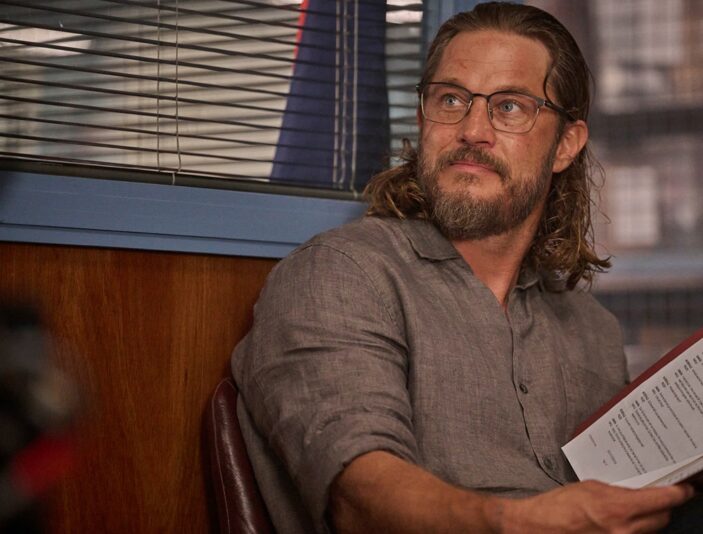
What happened to Zoe Jacobs?
In the returning season of Black Snow, Detective Cormack (Travis Fimmel) tackles two separate missing persons cases. One is professional, as he investigates the disappearance of Zoe Jacobs (Jana McKinnon), who disappeared from her own 21st birthday party in 2003. And the other is personal, as Cormack searches desperately for his own younger brother, who went missing when they were children.
Ahead of the anticipated return of the Logie-nominated show, Peter Gray was invited to the Queensland set earlier in the year to speak with cast and creators as they commenced filming.
To coincide with the show’s New Year’s release, Fimmel, McKinnon, and fellow cast members Megan Smart, Victoria Haralabidou and Kat Stewart, alongside creator Lucas Taylor and executive producer Rosemary Blight spoke with Peter about their characters in this continued narrative (well, what they could reveal), if they found any difficulty in maintaining cohesion across the show’s multiple timelines, and why Australian talent have found a home in the streaming service Stan.
As we were talking before about Simon Baker making some lighthearted comments about my “old school” recorder on the red carpet of Boy Swallows Universe, and that he directed you, Megan, in your first feature (Breath), how long have you been acting?
Megan Smart: I graduated from acting school in 2016
Jana McKinnon: About 20 years now (laughs). I didn’t go to drama school. That was not my introduction to the world of film. A friend of my mum’s was studying to be a director at a film school in Vienna. That’s where I grew up. I was kind of the only child she really knew, and she asked me if I could be in her student film. And then I started working with these other students from the university. It wasn’t until I got cast in a feature film when I was 14 that I thought it was a real job (laughs). I sat down with the director and was like, “Yeah, I’d love to do this (film), but I also want to get a job this summer. So I’d love to figure out how I can do both.”
Then he told me I was going to get paid, and I couldn’t believe it. I had no idea! I just did it as a hobby as a kid.
It seems like it’s paying off now…
Jana McKinnon: (Laughs) Yeah, I feel incredibly lucky.
Were you both up to date on the original Black Snow series when this came about for you?
Megan Smart: Yeah, I did. It’s such a hugely respected show in Australia, and obviously it went on to being incredibly successful. I was excited to audition for it. I jumped at the opportunity.
Jana McKinnon: Yeah, I watched it when it came out. We watched it in my sharehouse. It was a whole thing. It was quite exciting to get that audition.
If it’s not giving too much away, can you elaborate on each of your characters?
Megan Smart: I play Sam, who’s Cormack’s right-hand. Cormack is brought on to solve this cold case, and I’m the senior constable in the town. We work together to solve this case, and I’m learning from him, because in episode 1 when you first meet Sam, she’s asleep on the job. She’s really been phoning her life in. I think (the character of) Zoe gave her strength, and when (Zoe) left that opened up a lot of trauma. When you first meet Sam, she’s not a very good cop. She’s not trying her hardest, but she does care. She has a good heart. I think she’s just been disillusioned by the police force, and then she sees Cormack’s influence and that fires her up.
Did you have to work with any police officers? Or has it given you a newfound respect for the profession?
Megan Smart: Oh, hugely. Not just with the show, but with my own research of cops and detectives…it’s so different than what the movies present. It’s what I love about this job. You get to become an expert in this one tiny little area that you never would have before. It’s fascinating. It’s a profession you never would have thought about, and now you’re seeing it through a completely different lens.
And with the character of Zoe, as she is set in the past timeline, are you interacting with many of the cast?
Jana McKinnon: I’m very much in my own little bubble. It’s this own little world, set in the past, and what’s super important to Zoe are the friendships with the younger version of Megan’s character and the radio show they do together. She grows up with quite a lot of privilege, and even though she’s very passionate about justice, she can be a little bit blind to what’s going on right in front of her. I found that very interesting. I see it a lot with people in my personal life, but I feel like (Zoe) grows into a compassionate person towards those in her immediate surroundings. But then she learns things about those in her family and about her privilege and the system she grew up in, and who that system is rigged against. She’s on an interesting journey.
With the younger version of Sam featuring in scenes with you, Jana, are you, Megan, working with the actress that plays your younger self in order to maintain the same type of mannerisms? Or is it because there’s such a difference in your character from when she’s younger to now that it wasn’t as necessary?
Megan Smart: Yeah, I only met her (Alana Mansour) the day before filming. She’s got such a youthful energy and a lightness to her that I don’t have. And we purposely spoke about not mirroring that. We wanted to see how much of a toll this life has taken on her, so when we get to my version of the character there’s a lot more stillness to her. That comes with age as well, but it’s about that weight that comes with carrying the trauma around. It’s the heartbreak of realising that light has been sucked out of her.
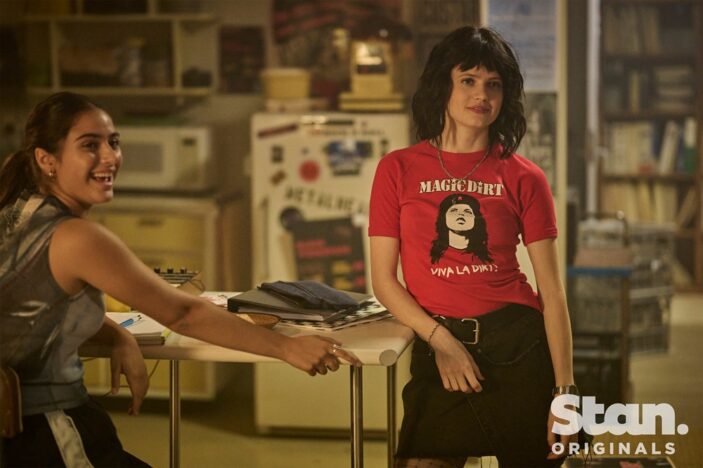
I spoke to you, Lucas, at the Brisbane premiere ahead of the first season’s release two years ago, and you mentioned how with that season it came about from throwing ideas to a wall and seeing what stuck. Did you have a particular roadmap for season 2?
Lucas Taylor: Yeah, Season 1, the franchise grew from the idea of the time capsule. That was a very clear starting point I had, and then we worked very collaboratively to build upon that world and discover the type of story that we knew we wanted to tell. We wanted it to be a really compelling whodunnit, but we wanted it to say something more. The process (for Season 2), probably because we had so many pieces in place with the character of Cormack and the way the show works, there’s a lot more clarification. A lot of the structure and DNA of the show was already there. We knew we wanted to tell another compelling mystery. We wanted it to be a missing persons case rather than a murder case, so we could take audiences somewhere new. And we knew we wanted to shine a light on the housing crisis.
Was Black Snow always envisioned as a multi-arc show?
Rosemary Blight: We always saw this as a multi-season arc. But we have the philosophy that we make every season as good as they can be, so that we aren’t relying on that promise of another season. I think, that way, you put everything into it. You aren’t trying to stretch it. We just have to make this as good as it can be, and if it’s great? We’ll go again. I believe we have an audience for James Cormack.
I don’t want to say “Were you surprised?” when it came to the reaction of the first season, but seeing just how much it resonated, is it ever something you get used to?
Lucas Taylor: It was certainly wonderful just how much people connected with this show. That was certainly what we set out to do, and what we hoped to do. We knew with Travis that we had a talent that people love, and he has a way with connecting people globally, which is what he has done on huge shows. But I will still say I was very happily surprised it did as well as it did (laughs).
I know Sian Davies, who directed episodes of the first season, is back. When it comes to episodes being helmed by multiple directors, is there a particular style they need to adhere to in order for the show to have a sense of cohesion? Or is each director allowed to showcase their own style within their episode?
Rosemary Blight: Sian is our set-up director, and she was for Season 1, and she’s very much the one to set the style and tone for what we’re doing this season. We then involve the other directors, but it doesn’t stop a director of other episodes leaving their mark. But tonally, we know where we want our characters to sit. Certainly, flourish away (laughs). Have fun. But we do want their to be a cohesiveness to the story.
Are you finding streaming services are making it easier for Australian stories to be told and consumed?
Rosemary Blight: It’s still a really challenging industry, without a doubt. We are in a really sweet spot here. I think Stan have announced 25 or shows, or something of that number, so as long as they keep doing it, we’re in a good place. I think what streaming services have done is allow us to tell bolder stories, because the audience reach is so different to a regular broadcaster. We can tell a commercially propulsive story, but it has something extra underneath. And with Travis Fimmel in the middle of it? I don’t think we could do that anywhere else.
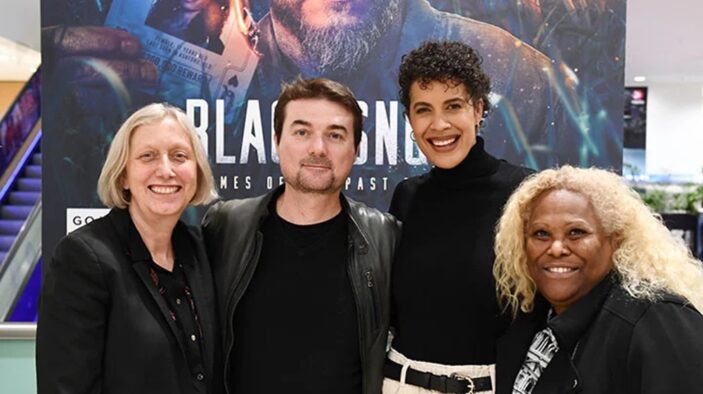
Travis, I was speaking to Lucas and Rosemary before about the show’s multi-season mentality. Was that always something you were aware of too?
Travis Fimmel: Yeah, I was privy to that. I’ve had to fend off so many questions about my character and his family, so I’m very glad that storyline can be incorporated into it. And then we have the very talented little Jana in the flashbacks, and she’s such a huge part of the show. She’s doing such a tremendous job. We don’t actually have any scenes together. She’s in the past. But it’s been great to have days like this where we can be together.
And knowing that Cormack had a future beyond the first season, did that inform the way you portrayed him throughout? Was there any holdings of cards close to your chest initially?
Travis Fimmel: Nah, mate, I’m always winging it (laughs). It takes a lot of work to not embarrass myself (laughs). The script was very detailed. It isn’t just a whodunnit, it’s a relationship driven show, and Cormack’s history with his brother and father was what really interested me. And even the story that Jana’s playing in, it’s very family orientated.
As an actor, how are you finding the ease of which it is to find roles and material now with streaming services?
Travis Fimmel: Yeah, it’s amazing having services like Stan. It’s great for Australia, and it’s great for Australian actors, because there’s just so much work for people. It’s showing the world what we can do. But every Aussie actor wants to work at home. Yeah, we go overseas to make more money, but I think there’s a greater future for productions in Australia.
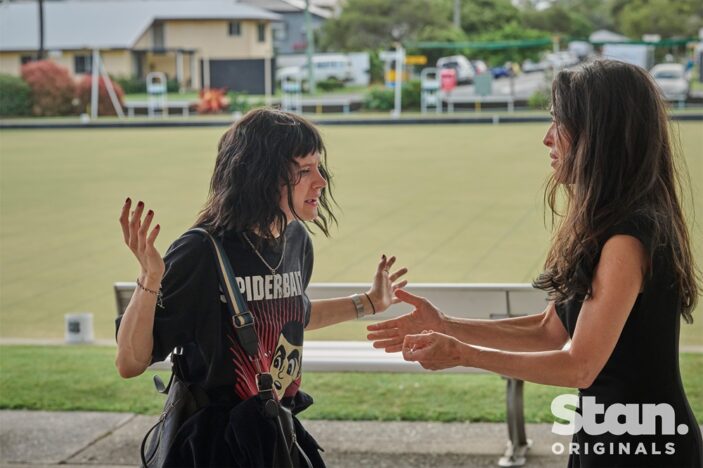
Victoria, without giving too much away, there’s so much secrecy surrounding this project, are you able to tell me about your character and where you are within the realms of the season’s narrative?
Victoria Haralabidou: I play Nadja, who is a mother and a wife, and she works at her husband’s construction company. She has a 20-year-old daughter (Zoe), and she’s who goes missing. That’s the story, and we follow this family and find out what’s going on. As an audience you’re trying to figure out what made Zoe be…
You’re in both of the timelines. Is there a process for you in terms of getting into the emotional state of where your character is at any given moment of shooting?
Victoria Haralabidou: I’d love to tell you “Yes.” (Laughs), but it’s constantly me reading through the script over and over. And it’s not just so I know my character, but the whole script, so that when somebody mentions you you know when it happens. Sian and Helena (Brooks), the two directors, what they do is…it’s like playing scales. You go back and forth. It’s combing through and constantly going through this run and seeing what else you can add. It’s always about never relaxing and always asking more questions.
Does that help you as an actress with the character? Your character would be asking so many questions about her daughter, so if you’re asking questions as an actress, do you see that as a mirror in any way?
Victoria Haralabidou: That’s a brilliant observation. The moment you have an answer to your question, it stops being “it”, you know? Ss my character and as an actress, I’m constantly asking questions and if I’m not getting answers, there’s an air to that. Audiences aren’t stupid either. They have their own sensitivities, and they’ll pick up on that. I’m asking questions to make my life harder. I’m not doing it to make it easier. I think that’s what made the first season so successful, that it wasn’t definitive.
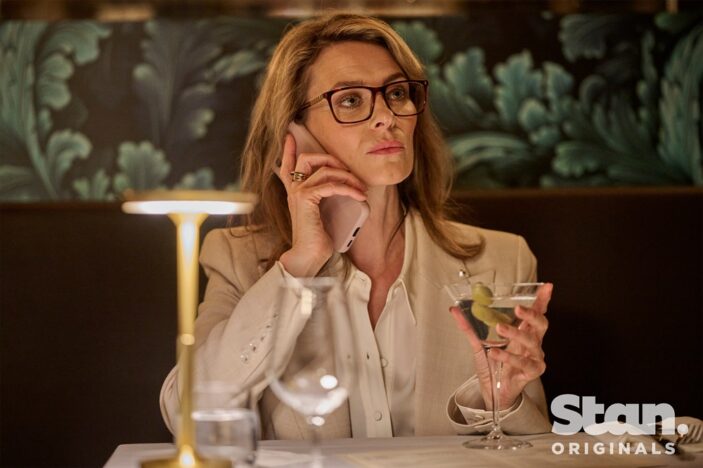
Going off the theme of secrecy, what is it that you can reveal, Kat, about your character, Julie Cosgrove?
Kat Stewart: I was really drawn to this because, A, I loved the first season and I think Lucas is such a talent. And B, I felt like Julie is someone I haven’t played before. I’ve played a lot of people who are vulnerable, or messed up, or have a chip on their shoulder, or just don’t have their shit together. Which I love! But Julie felt like someone very specific and very driven. Very clear about what she wants. When we first meet her she’s the mayor of the town, and then 20 years later she’s a senator.
I was asking Victoria this, regarding your character being present in both timelines. Is there any difficulty for you in finding the right emotional state for Julie as you’re filming?
Kat Stewart: I think that that’s the case when your character deals with trauma, which many of these characters do over the 20 years. Things for me are going pretty well (laughs). I was obviously aware of it, but I think (Julie) is very consistent with what she’s after.
Is there a moment that audiences that look out for? Was there anything you read that surprised you in terms of character motivation? Whether it’s Julie or someone else?
Kat Stewart: Several, actually. I think everyone’s got something to hide, and that’s the beauty of it. The show is constantly directing and misdirecting you, and we didn’t know what the ending was going to be, but the writing is done for you, so everything’s so skillful.
As an actress who has had such longevity in this industry and such a wide array of roles to your name, is there a genre or a type of character you still hope to explore?
Kat Stewart: You know, I should have a plan (laughs). I should be able to say “I want to work with blah, blah, blah”, but that’s one of the things about this industry, the surprises. You never know what’s going to come your way. 10 years ago I never would have thought I’d be playing a character like this. So, you just got to have fun with it, really. I don’t have a prescribed type of role I’d like to play. Having said that, I have always wanted to play in Who’s Afraid of Virginia Woolf?, and that’s happened. So maybe I agitated towards that. But generally speaking? I like to see what happens.
The first two episodes of Black Snow Season 2 are streaming on Stan Australia from New Year’s Day, January 1st, 2025.
